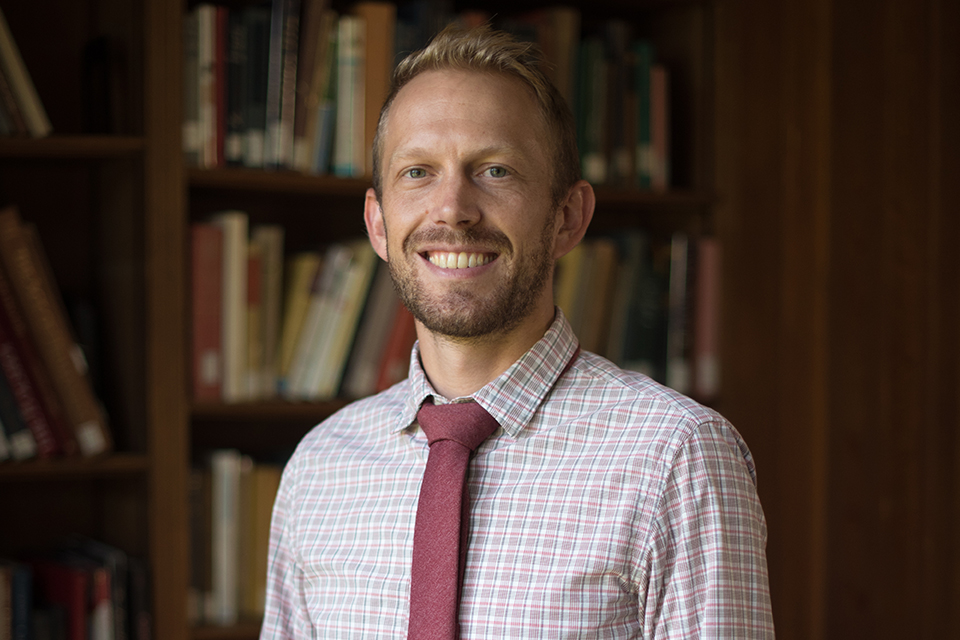John Bergdall, PhD’13, Investigates Number Theory at Brandeis and Beyond

April 29, 2019
Simon Goodacre | Graduate School of Arts and Sciences
John Bergdall, PhD’13, arrived on the Brandeis University campus in the Fall of 2009. As an undergraduate at the University of Minnesota, he was initially interested in computer science, but he gravitated toward the program’s courses in mathematics. In the end, he decided to switch gears and study mathematics full time. When he was looking to continue his education at graduate school, Bergdall was interested in moving to the Boston area. He was attracted to Brandeis’ history in mathematics. “So many of my older professors jumped on that option immediately when I said I'd like to try living in Boston,” he says.
During his undergraduate years, Bergdall had focused on number theory and algebra, and he delved into this research even more at Brandeis. When he arrived on campus, he tried to keep an open mind and avoid rushing into choosing a specialty or an advisor, but an advanced elective course in number theory was offered during his second semester. Even though it was an advanced course and Bergdall was still a new student, his undergraduate background in number theory made him “passably prepared.” The crucial impact of the course was its focus on modern research in the field. “There was no textbook, so everything we knew we knew it because we were proving it on the spot,” says Bergdall. After the semester was over, he felt that he “had the tools needed to attend seminars in the area” and understand the first 15-20 minutes of the talks. “From there, the trajectory just shoots up.”
Boston is a world center for this type of research. Brandeis’ proximity to the city offered Bergdall access to many number theory seminars in the Boston area, sometimes four or five times every week. “There is no better place to be if you want to be hooked into exactly what the most recent results are – and this is so crucial for young researchers looking to enter the field,” he says. The teaching fellowship program at Brandeis, which requires graduate students to teach only 4 out of 10 semesters, enabled him to attend these seminars frequently. “I was free to let my mind soak in the rich academic environment in the Boston area because I had so few semesters where I needed to physically be in a classroom multiple days a week,” he says.
John had strong relationships with faculty members in the mathematics department. He regards Susan Parker as “a significant resource for all the graduate students in navigating the five-plus years were spent studying for our PhD.” Parker was particularly helpful in preparing students to teach for the first time. He also credits his advisor, Joël Bellaïche, with helping in his job search and with preparing to give talks.
After Brandeis, Bergdall pursued postdoctoral research opportunities at Boston University and the Max Planck Institute (MPI) in Germany. “Both experiences were wonderfully liberating,” he says. Thanks to a grant from the National Science Foundation, he was not required to do any teaching at Boston University, which meant he could focus exclusively on his research in number theory. “Mathematics is very difficult to do with a distracted mind, so these long gaps without teaching are crucial,” he says. The work in Germany enabled Bergdall to leave the Boston bubble and see different kinds of number theory. He describes the experience as “both humbling and exciting!”
Following his postdoctoral research, Bergdall took a job at Bryn Mawr as Assistant Professor of Mathematics. He was attracted to the position because he enjoys “both the teaching and research aspects of being a mathematician,” and Bryn Mawr gives him the chance to pursue these interests “in a way where they are clear you should excel at both.” The mixture of teaching and research is not unusual, but Bryn Mawr provides resources for faculty to excel in both areas, which helped Bergdall make his decision. “I remember during the interview process feeling as though I was being offered a very unique opportunity and that I should make the most out of it.”
For students considering a graduate education in mathematics, Bergdall’s advice is to “keep an even perspective about your graduate experience and how long it is. While it is crucial for your progress that you work hard, meet with your advisors, complete assignments, and so on, it is also crucial for your well-being that you have a life you can be happy telling other people about!”






